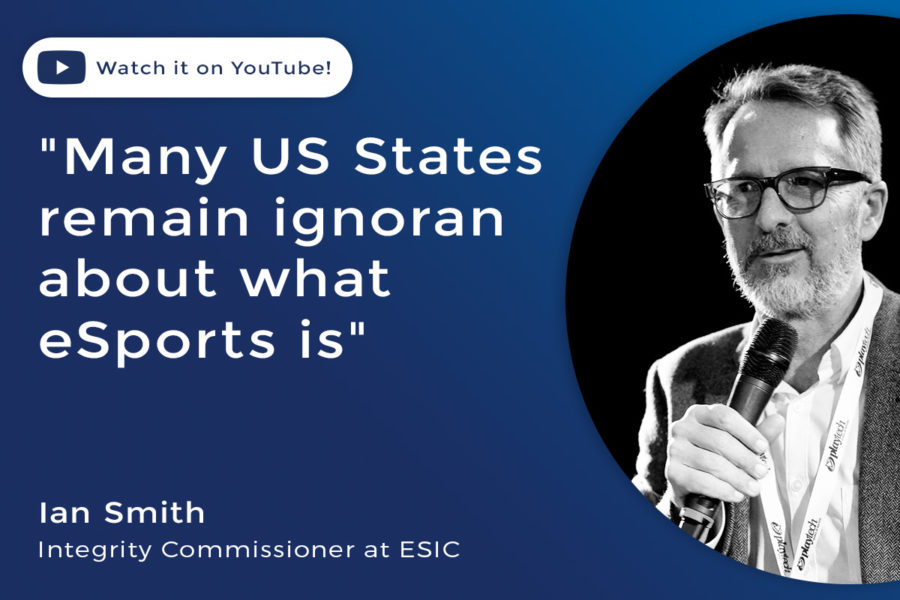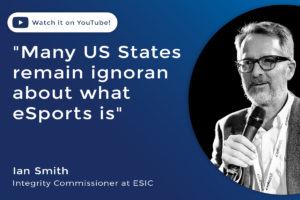“Many US States remain ignorant about eSports”

(Exclusive interview).- Ian Smith, Integrity Commissioner at the Esports Integrity Commission (ESIC) speaks to Focus Gaming News about the sector’s growth and challenges.
Ian Smith is a lawyer with a wealth of experience in integrity issues in traditional sports, particularly in cricket, spending a decade with the Federation of International Cricketers’ Associations, first as Legal Director and then as Chief Operating Officer.
Five years ago he took on what he describes as “an irresistible challenge”, to delve into the new, young world of esports and bring order to the chaos.
What began as a threat assessment that Ian thought would be carried out by someone else led to the creation of ESIC, a not for profit members’ association of esports stakeholders that tackles issues such as match fixing, betting fraud and other integrity issues as well as promoting best practice in youth protection and events safety to help guide a fragmented industry.
Its aims are similar to those of integrity bodies in traditional sports, but its jurisdiction is based on contract rather than governance registration.
He admits he expected someone else would be running the organisation, but has relished the challenge and found himself engaged by a vibrant, fast-moving industry.
“The community and industry is very vibrant. Things move very quickly.”
Ian Smith, Integrity Commissioner, ESIC.
Ian admits ESIC was lucky to start at the top with early members including the tournament operators ESL and Dreamhack. New members continue to join, and betting operators are coming on board as anti-corruption supporters, but Ian admits progress is slow, with betting firms understanding more readily than esports producers and tournament organisers the need for integrity standards.
“On the betting side the growth is very rapid. Betting operators understand immediately.”
Ian Smith, Integrity Commissioner, ESIC.
He thinks we’re not far off seeing globalised standards, noting that there are three areas that ESIC believes esports needs to set standards: integrity, youth protection, and events safety.
The games and tournaments themselves, being privately owned, do not need any kind of standards body, he says.
However he says progress is held up by tournament operators in areas such as China not accepting claims of manipulation, and also the publishers themselves, who know little about the betting industry and “have an antipathy towards betting on their games.”
Three games from US west coast producers make up 80 per cent of the esports betting market, Ian says.
“There is no other body. We’re it.”
Ian Smith, Integrity Commissioner, ESIC.
As for match fixing, Ian notes that esports has its advantages with a clear digital record of everything that happens in a game helping to remove the subjectivity involved in analysing match fixing claims in traditional sports.
In terms of collaboration from national and regional gambling regulators, Ian says the response has been patchy. He signals out the UK Gambling Commission, the Malta Gaming Authority and the Nevada authorities as being particularly forward looking and to have “gone to great pains to educate themselves on esports,” but said “many US states remain in complete ignorance about what esports is.”
Not a fan of the divided approach to gambling regulation, Ian said: “The idea that you can control gambling in jurisdictions at a state level is delusional.”
Regarding the future of esports betting, Ian believes it’s likely to remain a niche market and that the growth seen during the pandemic will largely be lost once traditional sports return, but sees a chance to retain some of the new audience.
“The fact we’ve been the only show in town has been a massive boost,” he said. “If the industry can retain 10 per cent of new customers it will be a triumph.”
Check out the full interview with Ian Smith below or on the Focus Gaming News YouTube channel. Don’t forget to subscribe!











